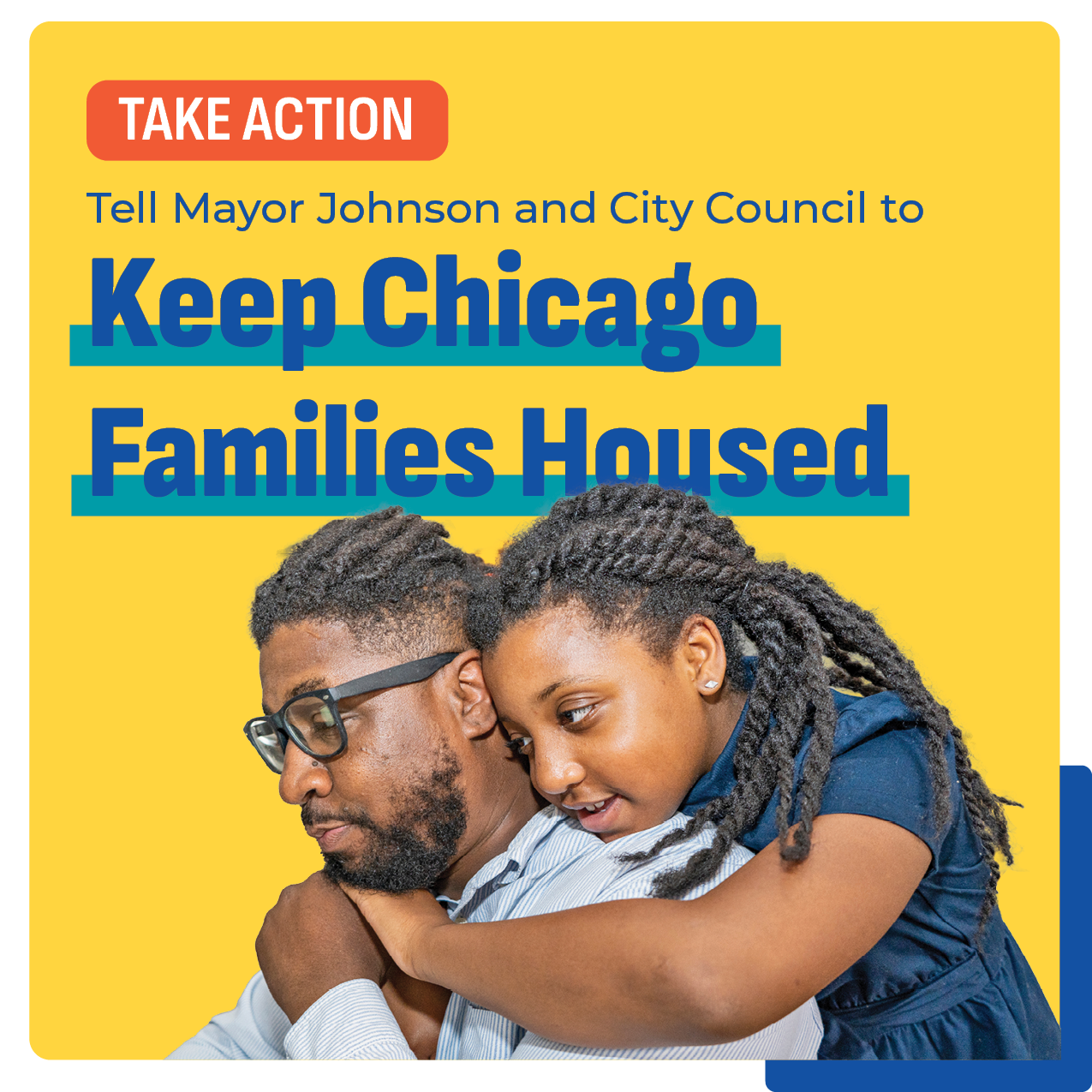
By Sam Paler-Ponce, Associate Director of City Policy
Mayor Brandon Johnson’s proposed 2025 budget includes some positive steps to address homelessness, yet it falls short of meeting the city’s true needs for long-term housing. Without dedicated revenue streams for permanent housing solutions, Chicago’s approach risks keeping many temporary shelter residents unhoused, instead of supporting their path to stable housing with supportive services. Chicago needs a more comprehensive budget that better funds proven solutions like the Flexible Housing Pool and addresses gaps left by the unmet potential of Bring Chicago Home.
Temporary relief but few long-term solutions
Mayor Johnson’s budget proposal includes $22 million to expand shelter capacity, merging legacy shelter beds with new arrivals shelter beds. The Mayor’s Office announced their plan to merge the two shelter systems last month. As of January 1, 2025, the unified system will offer 6,800 beds, comprised of 3,000 traditional shelter beds, 2,100 city-operated new arrival beds, and 1,700 state-operated new arrival beds. The city’s latest count shows a shortage of over 4,000 shelter beds, meaning that even this expanded shelter funding will leave many without adequate support.
Another $7 million goes to Rapid Rehousing, bringing the city’s total contribution to this program to $13.5 million. Rapid Rehousing provides short-term rental assistance and support to help people move quickly from homelessness to short-term housing, a vital part of the city’s Accelerated Moving Events.
Focusing on shelters and short-term programs alone won’t address the root causes of homelessness or reduce the numbers on our streets and in our emergency shelters. Permanent housing with supportive services is what will break this cycle for Chicagoans experiencing homelessness. Unfortunately, while the proposed budget includes critical funding for Rapid Rehousing and shelters, it lacks the investments needed to make permanent housing options available.
The impact of losing COVID-era funding
For the last few years, federal American Rescue Plan Act (ARPA) funds have supplemented Chicago’s budget for essential programs addressing homelessness. ARPA funds have supported everything from the Right to Counsel program for renters facing eviction to the Flexible Housing Pool, a proven solution for permanent supportive housing. But these funds are winding down, creating a crisis point for city services. Programs funded by ARPA dollars helped keep thousands of Chicagoans housed during the pandemic, but the city’s budget will need to make up this difference going forward to prevent a surge of people newly experiencing homelessness.
Bring Chicago Home could have made a difference
If the Bring Chicago Home initiative had been approved, Chicago would now have a dedicated revenue source for housing solutions aimed at reducing homelessness. This funding could have supported initiatives to house the over 20,000 Chicago Public School students currently experiencing homelessness and provided resources to address the growing number of people living in encampments across the city.
The burden on our shelter system would have been reduced, enabling the city to close the 4,000 – bed gap that we still face. Permanent solutions require stable funding, and while we continue to advocate for Bring Chicago Home, we must not allow this funding gap to persist at the cost of increased homelessness.
The funding generated from Bring Chicago Home would never have gone to shelter beds or balancing the city budget; these much-needed funds were set to go specifically to fund long-term solutions through permanent housing and wraparound services.
We are seeing in real time the impacts of the misleading and false narratives spread by the real estate lobby and conservative interests during the Bring Chicago Home Ballot referendum this past March. Powerful and well-funded interests misled the public that supporting Bring Chicago Home on the ballot would raise their rents or property taxes. Now, we are left without much-needed funding for permanent housing and wraparound services—and still have a looming property tax hike on the horizon that could have very real consequences for many Chicagoans.
Flexible Housing Pool: a proven solution needing support
One of Chicago’s most successful programs in providing permanent housing and support for those experiencing homelessness is the Flexible Housing Pool (FHP). This multi-agency program addresses homelessness by providing stable housing to people frequently interacting with crisis systems like emergency rooms and jails. In doing so, it saves both the city and taxpayers millions of dollars while transforming lives.
Currently, the Flexible Housing Pool provides housing and support services to over 1,400 Chicagoans, including 500 children. But inflation and rising rent costs have outpaced the current funding. Without an additional $5.2 million—bringing the total funding for 2025 to $11.2 million—families currently in the program are in jeopardy of losing their housing.
To ensure these families retain their housing, the city must commit to fully funding the Flexible Housing Pool. The benefits of this program extend beyond housing stability; it also reduces reliance on expensive emergency services and improves participants’ health and well-being.
Moving forward: advocating for dedicated revenue
To create long-term solutions, we must prioritize a dedicated revenue stream for homelessness and housing. The Bring Chicago Home coalition remains committed to this goal because it is the most sustainable way to generate the resources needed for housing-based solutions. But until we achieve this, we must make sure that programs like the Flexible Housing Pool have the funding they need.
Call to action
As we continue our work t o ensure every Chicagoan has a safe pl ace to call home, we are calling on our supporters to urge Mayor Johnson and their Aldermen to support the full $11.2 million in funding for the Flexible Housing Pool. This investment will prevent many Chicagoans from re-entering homelessness and the costly crisis systems that accompany it.
Please take a moment to contact your alderperson and the mayor’s office . Together, we can push for a Chicago where everyone has the opportunity to thrive.
The post Chicago’s 2025 budget breakdown appeared first on Chicago Coalition to end Homelessness .


